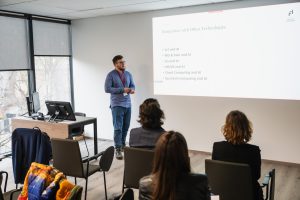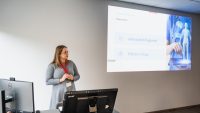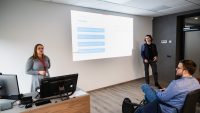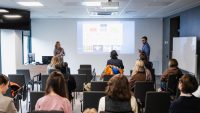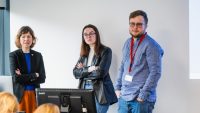VMU Ukrainian Centre Organized a Discussion on AI
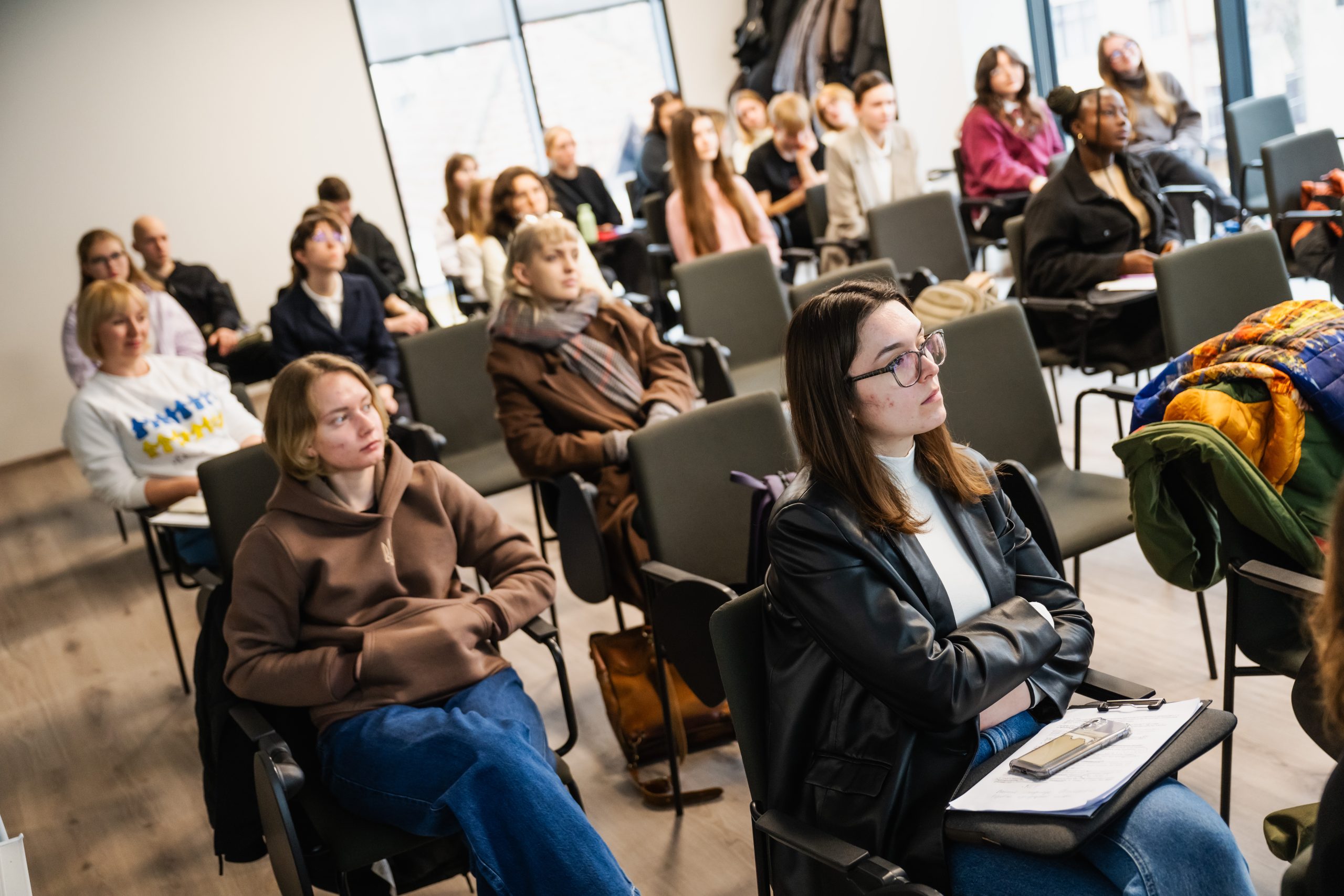
On March 13th, Vytautas Magnus university and its Ukrainian centre in Kaunas organized another Youth think tank, supported by Ukrainian centre in Vilnius and British Council. The event titled AI’s impact on our Future: Expectations and Limitations, Opportunities and Challenges was held in English and Ukrainian languages and gathered more than 30 participants, mostly – Ukrainian children from “Herojus” school and VMU international students. Five presentations were delivered by VMU employees, student and alumni.
Gabrielė Janciūtė, Junior researcher at VMU Faculty of Informatics, presented an expanding field of artificial intelligence (AI) in medicine, emphasizing its rapid evolution and profound impact on healthcare. It outlined key areas where AI is making significant strides, including diagnostics, disease forecasting, and medical image analysis. Through automated diagnosis and effective triage systems, AI aids in faster and more accurate disease identification, improving patient care and access to treatment. Moreover, by leveraging vast datasets, AI can predict disease progression. Computer vision technologies enhance medical imaging interpretation, facilitating early detection and precise diagnosis. The presentation underscored several advantages of AI in medicine. However, it also addressed challenges like ethical data use and bias.
Anton Bakaliuk, VMU Master student in Applied Informatics, delved into the topic of AI in computer vision applications, which also presents numerous opportunities and challenges. According to Anton, benefits involve automation (AI-driven computer vision can automate various tasks such as object detection, classification, and tracking, reducing the need for manual intervention), improved accuracy, enhanced efficiency, innovation and cost reduction (reducing errors and minimizing the need for human labor in repetitive tasks). However, there are many challenges related to data quality and quantity, interpretability, sufficient hardware, etc. As in any other AI related field, the ethical and privacy concerns are demanding additional attention. The deployment of computer vision technologies raises concerns about privacy infringement, biased decision-making, and potential misuse of personal data. Addressing these challenges requires interdisciplinary efforts involving expertise in machine learning, computer vision, data management, ethics, and hardware optimization. Despite the challenges, the opportunities presented by AI in computer vision applications continue to drive innovation and transformative changes across various industries.
Dovilė Kuizinienė, a PhD student and junior researcher at VMU Faculty of Informatics, discussed AI in finance. Throughout her interactive presentation, participants were asked to guess what are the main problems to finding reliable AI solutions in financial calculations and predictions. According to Dovilė, in order to create a good AI solution for the financial sector, we rely on data. However, the big data is not always the answer. Data pre-processing is one of the key aspects of efficient model (system) creation. Now the financial sector has been implementing the community-based systems and pay-as-you-go or pay-how-you-use principles. However, there are still many issues related to financial calculations and predictions.
Bohdan Zhyhun, VMU employee at the Department of Applied Informatics, talked about AI in Security. According to him, in today’s digital landscape, the role of Artificial Intelligence in enhancing cybersecurity cannot be overstated. Unlike traditional software that relies on predefined rules and databases, AI algorithms excel in detecting and analyzing novel cyber threats through pattern recognition and anomaly detection. This allows for a proactive rather than reactive approach to cybersecurity, significantly reducing the time to identify potential threats. As Bohdan pointed out, in the banking and financial sectors, AI has become an invaluable ally in the fight against fraud. By analyzing transaction patterns, AI systems can swiftly identify deviations that suggest fraudulent activities. This not only helps in the immediate detection of fraud but also aids in understanding and predicting future fraudulent tactics. AI’s ability to learn and adapt over time means that these systems become increasingly effective at spotting fraud.
However, as in other AI related fields, there many challenges, especially related to ethical use of AI. There are emerging privacy concerns with data sensitivity, consent and transparency, surveillance and monitoring, data protection regulations among others. Also, researchers are talking about the risk of dependency and over-reliance. According to experts, it is important to maintain essential human oversight to prevent over-dependence on automated systems and ensure balanced decision-making. The risk of skill erosion must also be addressed. In conclusion, as Bohdan suggested, it is essential to recognise the limitations of AI technology and the importance of human intuition and experience in complex situations.
Viktoriia Oksymets, a fresh graduate from VMU Faculty of Political Science and Diplomacy, presented the impact of artificial intelligence on journalism practices and content creation. Based on her Master thesis, Viktoriia examined how AI-powered technologies are already being used in various ways in newsrooms across the globe at every step of the content creation process: newsgathering, news production and news distribution.
In this 3-step news lifecycle, AI can be used for fact/claim checking and verification, interviewing, media and data analysis, news generation, multimedia production, automating news summaries, editing content organisation, personalised content recommendations, audience engagement and analysis, translation, social media monitoring and sentiment analysis, discovering news trends. While Viktoriia presented some leading newspapers and magazines from US (The Washington Post, The Associated Press, The New York Times) in terms of AI adoption in media, she also named a few examples of Ukrainian media, that are cautiously but courageously exploring AI (e.g., Babel, Nickcenter, Durchschlag Ezine, Texty). In agreement with a commonly raised concerned, Viktoriia noted that while AI offers many opportunities in journalism, it also poses challenges, including ethical considerations and potential loss of public trust. Summing up Viktoriia reinstated that only combining human expertise with AI’s capabilities can yield satisfactory results.
The event has culminated in interactive tasks, involving practical application of ChatGPT skills in group competitions. Participants learned from each other when trying to solve AI related puzzles. The winning teams were awarded symbolic prizes.


